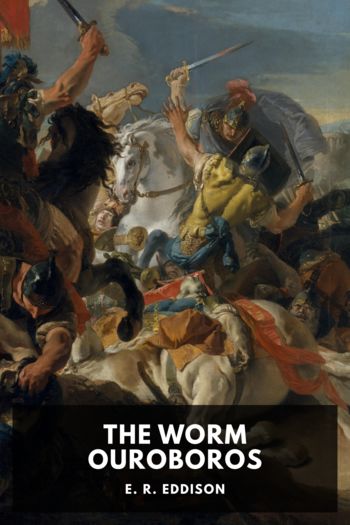The Cream of the Jest by James Branch Cabell (the first e reader TXT) 📕

- Author: James Branch Cabell
Book online «The Cream of the Jest by James Branch Cabell (the first e reader TXT) 📕». Author James Branch Cabell
And thus, with no word uttered, Felix Kennaston understood that his wife must disclaim any knowledge of the sigil of Scoteia, should he be bold enough to speak of it. He knew he would never dare to speak of it in that constricted hidebound kindly life which he and Kathleen shared in the flesh. To speak of it would mean to become forthwith what people glibly called insane. So Horvendile and Ettarre were parted for all time. And Kathleen willed this, no matter with what wistful tenderness, and because of motives which he would never know—for how could one tell what was going on inside that small round head his hand was caressing? Still, he could guess at her reasons; and he comprehended now that Ettarre had spoken a very terrible truth—“All men I must evade at the last, and innumerable are the ways of my elusion.”
“Well, dear,” he said aloud; “and was it a pleasant party?”
“Oh, so-so,” Kathleen conceded; “but it was rather a mixed crowd. Hadn’t you better hurry and change your clothes, Felix? It is almost dinnertime, and, you know, we have seats for the theater tonight.”
Quite as if he, too, were thinking of trifles, Felix Kennaston took up the two bits of metal. “I have often wondered what this design meant,” he said, idly—not looking at her, and hopeful that this much allusion at least was permitted to what they dared not speak of openly.
“Perhaps Mr. Harrowby could tell you.” Kathleen also spoke as with indifference—not looking at him, but into the mirror, and giving deft final touches to her hair.
“Eh—?” Kennaston smiled. “Oh, yes, Dick Harrowby, I grant you, has dabbled a bit in occult matters, but hardly deep enough, I fancy, to explain—this.”
“At all events,” Kathleen considered, “it is a quarter to seven already, and we have seats for the theater tonight.”
He cleared his throat. “Shall I keep this, or you?”
“Why, for heaven’s sake—! The thing is of no value now, Felix. Give it to me.” She dropped the two pieces of metal into the wastebasket by the dressing-table, and rose impatiently. “Of course if you don’t mean to change for dinner—”
He shrugged and gave it up.
So they dined alone together, sharing a taciturn meal, and duly witnessed the drolleries of The Gutta-Percha Girl. Kennaston’s sleep afterward was sound and dreamless.
XXXIX Past Storisende Fares the Road of Use and WontHe read The Tinctured Veil in print, with curious wistful wonder. “How did I come to write it?” was his thought.
Thereafter Felix Kennaston, as the world knows, wrote no more books, save to collect his later verses into a volume. “I am afraid to write against the author of The Tinctured Veil,” he was wont flippantly to declare. And a few of us suspected even then that he spoke the absolute truth.
Meanwhile, Mr. and Mrs. Kennaston continued their round of decorous social duties: their dinner-parties were chronicled in the Lichfield Courier-Herald; and Kennaston delivered, by request, two scholarly addresses before the Lichfield Woman’s Club, was duly brought forward to shake hands with all celebrities who visited the city, and served acceptably in the vestry of his church.
Was Felix Kennaston content?—that is a question he alone could have answered.
“But why shouldn’t I have been?” he said, a little later, in reply to the point-blank query. “I had a handsome home, two motors, money in four banks, and a good-looking wife who loved and coddled me. The third prince gets no more at the end of any fairy tale. Still, the old woman spoke the truth, of course—one pays as one goes out. … Oh, yes, one pays!—that is an inevitable rule; but what you have to pay is not exorbitant, all things considered. … So, be off with your crude pessimisms, Harrowby!”
And indeed, when one comes to think, he was in no worse case than any other husband of his standing. “Who wins his love must lose her,” as no less tunefully than wisely sings one of our poets—a married bard, you may be sure—and all experience tends to prove his warbling perfectly veracious. Romancers, from Time’s nonage, have invented and have manipulated a host of staple severances for their puppet lovers—sedulously juggling, ever since Menander’s heyday, with compromising letters and unscrupulous rivals and shipwrecks and wills and testy parents and whatnot—and have contrived to show love overriding these barriers plausibly enough. But he must truly be a boldfaced rhapsodist who dared at outset marry his puppets, to each other, and tell you how their love remained unchanged.
I am thus digressing, in obsolete Thackerayan fashion, to twaddle about love-matches alone. People marry through a variety of other reasons, and with varying results: but to marry for love is to invite inevitable tragedy. There needs no side-glancing here at such crass bankruptcies of affection as end in homicide or divorce proceedings, or even just in daily squabbling: these dramas are of the body. They may be taken as the sardonic comedies, or at their most outrageous as the blustering cheap melodramas, of existence; and so lie beyond the tragic field. For your true right tragedy is enacted on the stage of a man’s soul, with the man’s reason as lone auditor.
And being happily married—but how shall I word it? Let us step into the very darkest corner. Now, my dear Mr. Grundy, your wife is a credit to her sex, an ornament to her circle, and the mainstay of your home; and you, sir, are proverbially the most complacent and uxorious of





Comments (0)